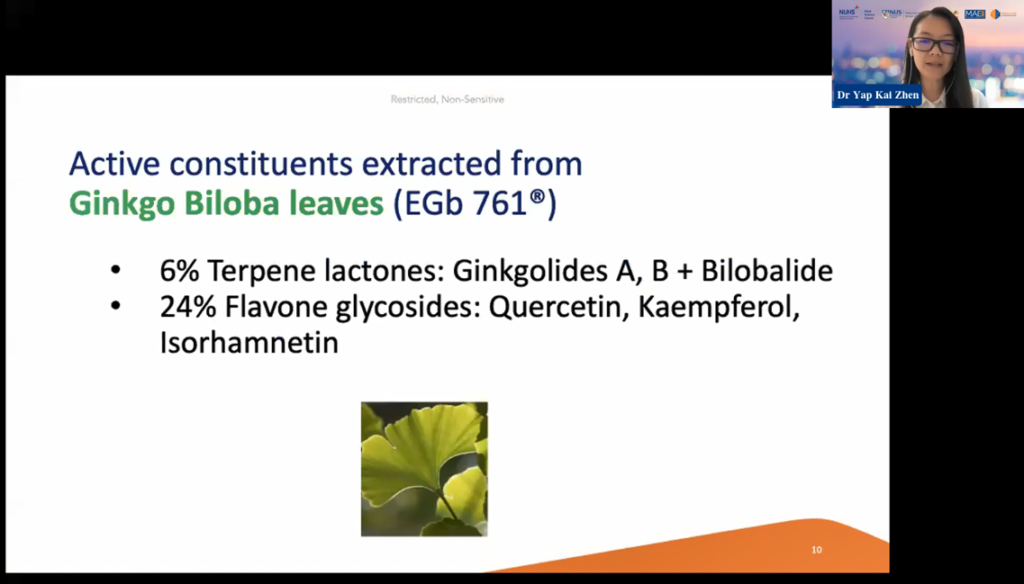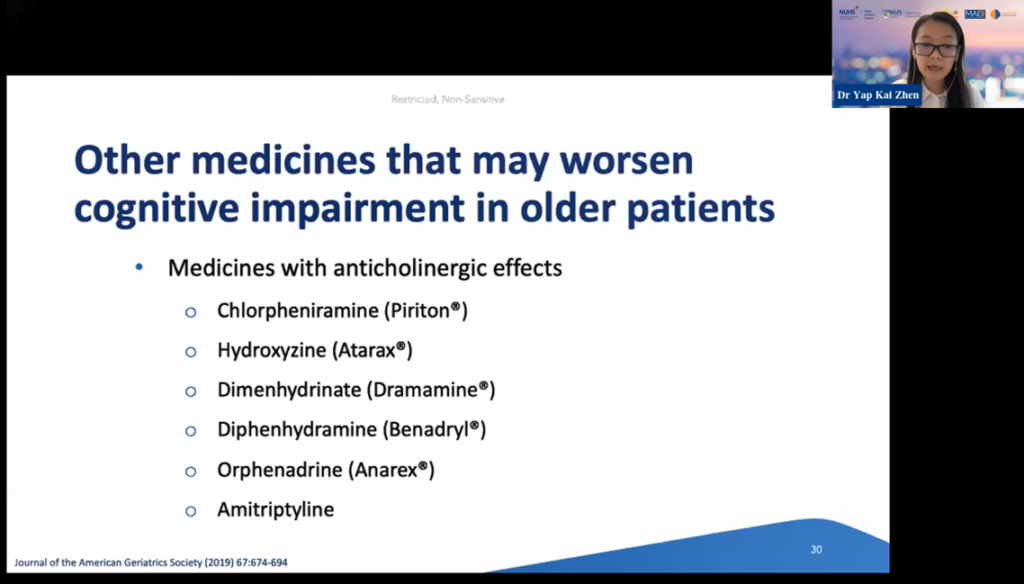‘Memory & Medications’ Webinar Highlights: 21 Nov 2022

‘Living with Dementia’ webinar series, which was first launched in April 2022, is Mind Science Centre’s key effort to build the foundations of a strong dementia support network through informative talks and discussions. This initiative was made possible by the generous donation from Professor Hong Hai and Ren Hai Centre Limited. All information will be made readily available to the public through our website, with the aim of developing a multi-faceted archive of relevant and relatable information.
The first topic ‘Coping Strategies for Caregivers’ had a great reception and the team has been working to bring another highly popular topic for the second webinar. For the second webinar of the series, we are grateful to have Associate Professor Tan Chay Hoon and Dr Yap Kai Zhen onboard with us for the topic of ‘Memory & Medications.

A/Prof Tan is a distinguished figure in Pharmacology and currently held various appoints across institutions, namely the President-Elect of the Asian College of Neuropsychopharmacology, visiting senior consultant psychiatrist at the National University Hospital; and Associate Professor in the Department of Pharmacology at the National University of Singapore (NUS). Well-known as a passionate medical educator, she was the recipient of multiple University Excellent Teaching Awards and named as NUS Faculty of Medicine Outstanding Educator in 2016.

Dr Yap is a proficient pharmacist with many years of experience and is currently a lecturer in the Department of Pharmacy at NUS. Her education, research and practice centre around her interest in helping older patients make the best use of their medicines at home. Serving as a council member of the Pharmaceutical Society of Singapore, she oversees the public education work and is the faculty in charge of CHAMP, a pharmacist student-led volunteering programme. The programme provides befriending and medication reconciliation outreach to older adults under the care of social workers.

The one-hour webinar received an overwhelming response and participation from 284 attendees, who tuned in from Australia, China, Malaysia, New Zealand, the Philippines, Singapore and Thailand.
Watch the full recording to find out more!
KEY MESSAGES
- Memory is made up of attention, storage and recall. As long as we get the essential nutrients and sufficient rest, it will be a great help towards ensuring that we have a good memory.
- It is recommended that one should seek advice from the healthcare provider or a pharmacist before taking any supplements or vitamins, especially when one has pre-existing conditions or medications. This will help to avoid any interactions between the supplements and medications.
- Taking supplements and vitamins requires us to ensure a delicate balance. Too much or too little vitamins can have consequences for the human body. Vitamins can improve brain health in older adults, but only when the symptoms were caused by deficiencies in certain nutrients.

- Research on Ginkgo Biloba is centred around EGb761 formulation only and the expert panel has recommended it as part of the multidomain intervention for symptomatic treatment of adults with mild cognitive impairment. The formulation may not be present in all Ginkgo products. There may be side effects associated with the use of the Ginkgo Biloba extract as well. Specifically, it should not be concurrently used with any medications with blood-thinning effects.
- There is no evidence that taking Ginkgo Biloba improves exam results. Parents should note that this supplement does not produce instant memory effects and giving a new supplement to your children before exams may risk developing unexpected side effects that will impact the exams instead.

- There are common medications for Alzheimer’s disease, but they are not a cure. Medications are targeted at the symptoms that impact daily functioning, such as problems of memory, behaviour and emotion. The two clusters of medications are acetylcholinesterase inhibitors and NMD antagonists. In particular, the medication for memory loss is called Memantine, which works by keeping the amount of glutamate in the brain under control, which ensures effective neural transmissions.
- Doctors will be able to prescribe different combinations of medication for the management of mild to severe stages of dementia. Common side effects associated with the medication usually improve with time. Please see the screenshot below for the recommended ways to manage the side effects. If you experience severe side effects, stop the medication and consult your healthcare provider immediately.

- Sleeping pills can affect memory. Avoid using over-the-counter medications for sleep issues, especially for the elderly. It is recommended that people, who struggle with sleep issues, engage in non-drug treatment methods first. This includes:
- Avoid taking naps in the daytime
- Create a conducive habit or environment for sleep
- Avoid stimulating activities before sleep time
- Remove caffeine from your diet
- Engage in mindfulness activity, i.e. taking a mindful walk in nature
- Poor memory, may not always call for medical attention. It can simply be that someone was not paying attention or had a lack of sleep, which can be resolved easily. However, poor memory which is associated with symptoms of stress, anxiety and depression, will require medical assistance.
- For the elderly, it is recommended to avoid the medications listed in the screenshot below, which may worsen cognitive impairment.

- Medicine storage instructions stated on the packaging should be adhered to. HealthHub is a useful resource portal to refer to if you require more information on the medication.
We are still in the works to compile the answers for the questions submitted during the webinar and will be updating the article once it’s ready!
MEDICAL DISCLAIMER
All content and media on the Mind Science Centre website are created and published online for informational purposes only. It is not intended as a substitute for professional medical advice and should not be relied on as health or personal advice. Always seek guidance from your doctor or other qualified health professional with any questions you may have regarding your health or a medical condition. Never disregard the advice of a medical professional, or delay in seeking it because of something you have read on our website.
If you wish to seek clarification on the above matters please don’t hesitate to get in touch with us.
RELEVANT LINKS
AWE Homepage: https://medicine.nus.edu.sg/nmsc/awe/
AWE E-Learning Portal: https://awe.unilearn.edu.sg/
MSC Donation link: https://bit.ly/mscgiving
We hope you enjoyed this webinar, and we look forward to seeing you again. Mind Science Centre has shared the video for educational purposes, in line with our goals to share knowledge and benefit the community. Please do not replicate the videos or slides without permission.
For more information and free online mental health resources, sign up for our mailing list HERE.
